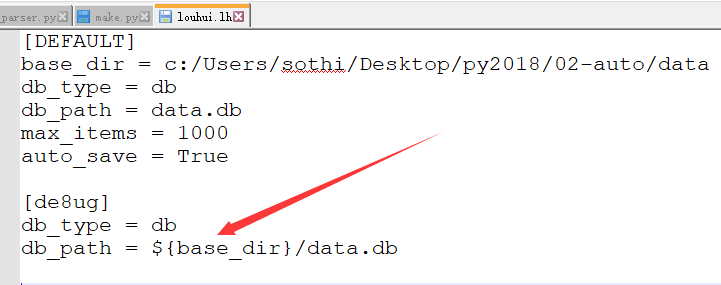configParse模块
一、配置文件简介
在各种程序里面都有配置文件,为了对配置文件进行操作。 python中引入了configParse模块进行操作。
配置数值类型:
配置文件中,我们看到的bool型,整数型,在我们操作的时候,都是字符串类型。
配置文件的三种定义:
section:章节。 章节需要注意,大写的DEFAULT的基类,下面所有新增加的章节,都会继承这个,后面章节不写option都会继承这个章节的。
option :选项,是每一个章节的定义。
value:选项的值

二、配置文件模块的使用
2.1 初步认识使用方法
import configparser
import os
conf = configparser.ConfigParser() # 第一步:生成一个configParser对象,所有的操作都是根据这个对象来的,
conf['DEFAULT'] = {} # 第二步:先生产一个章节,必需先定义一个字典 (空字典,或 有值的字典 或 k,v的方式)
conf['DEFAULT']['base_dir'] = 'c:/Users/sothi/Desktop/py2018/02-auto/data'
conf['DEFAULT']['db_type'] = 'db'
conf['DEFAULT']['db_path'] = 'data.db'
conf['DEFAULT']['max_items'] = '1000'
conf['DEFAULT']['auto_save'] = 'True'
conf['louhui'] = {}
conf['louhui']['auto_del'] = 'True'
# 第三步:写入到文件中
base_dir = r'C:\Users\LH\Desktop\data'
path = os.path.join(base_dir, 'comeon.ini')
with open(path, 'w') as f:
conf.write(f) # 使用conf对象进行io
2.2 配置文件的读写
2.2.1 写入到配置文件
base_dir = r'C:\Users\LH\Desktop\data'
path = os.path.join(base_dir, 'comeon.ini')
with open(path, 'w') as f:
conf.write(f) # 使用conf对象进行io。 conf就是上面的对象
2.2.2 读取配置文件到内存中
base_dir = r'C:\Users\LH\Desktop\data'
path = os.path.join(base_dir, 'comeon.ini')
# 读取配置文件
conf = configparser.ConfigParser() # 定义一个对象接收
conf.read(path)
三、各种方法大全
配置文件的所有操作都是基于 configParse对象来操作。这点记住
3.1 增加
增加有两种方法:使用字典的形式来操作 或 使用内置方法
# 1.用前面写的方式追加
conf['diaosinan'] = {}
conf['diaosinan']['auto_add'] = '1'
with open(path, 'w') as f:
conf.write(f)
# 2.使用add_section进行追加,使用set使用set进行各种修改
conf.add_section('diaosinan')
conf.set('diaosinan','auto_dellll', '1') # set可以进行修改,也可以添加
conf.set('DEFAULT', 'auto_save', 'False') # 修改父类的val
print(conf['louhui']['auto_save']) # 子类直接改变
3.2 删除
- self.conf.remove_option()
- self.conf.remove_section()
def delete_option(self, section, option):
'删除指定的section下的option'
if self.conf.has_section(section) and self.conf.has_option(section, option):
self.conf.remove_option(section, option)
else:
print('section or option is wrong!')
3.3 修改
直接使用3.1中的set可以进行修改。
3.4 查看
查看的各种方法
conf.has_section() # 查看是否有该章节
conf.has_option() # 查看是否有该option
conf.sections() # 返回所有的章节.默认的大写的DEFAULT是不返回的,DEFAULT是默认的基类,类似继承,下面所有的都会继承这个属性
conf.options(section) # 查看section下的所有章节
conf.items() # 打印所有的项目
配置文件中获取的val是字符串,进行类型转换
# 获取指定的值
result = conf['louhui']['auto_save'] # 定义louhui这个章节的时候,没有auto_save,但是我们能打印出来,继承了DEFAULT
print(result, type(result)) # 返回的默认就是字符串. 我们可以用两种方式 进行 转换
print(conf.options('louhui'))
# 方式1
bool(result)
# 方式2
y = conf.getboolean('louhui','auto_save')
print(y, type(y))
## 或
louhui = conf['louhui'] # 定义一个变量名,存这个章节的对象
y = louhui.getboolean('auto_save')
s使用字典的方式进行操作
louhui = conf['louhui'] print(louhui['auto_save']) print(louhui.get('auto_save'))
打印整个配置文件
# 打印整个配置文件
for k,v in conf.items():
print(f'{[k]}')
for key, val in conf.items(k):
print(key, val)
print('')
3.5 替换变量:
替换变量:

import configparser,os
base_dir = r'C:\Users\LH\Desktop\data'
path = os.path.join(base_dir, 'louhui.lh')
# conf = configparser.ConfigParser()
conf = configparser.ConfigParser(interpolation=configparser.ExtendedInterpolation())
conf.read(path)
print(conf['de8ug']['db_path'])
四、自己封装的一个config类:

1 import configparser,os 2 3 4 class MyConf: 5 def __init__(self, path: str): 6 '初始化的时候读取配置文件' 7 self.path = path 8 self.conf = configparser.ConfigParser() 9 self.conf.read(self.path) # 空文件也不会出错 10 11 def add(self, section): 12 '增加一个章节' 13 if self.conf.has_section(section): 14 print('改章节已经存在') 15 else: 16 self.conf.add_section(section) 17 18 def write(self, dic: dict): 19 '直接写入一个字典' 20 for k, v in dic.items(): 21 self.conf[k] = v 22 23 def del_section(self, section): 24 '删除section' 25 if self.conf.has_section(section): 26 self.conf.remove_section(section) 27 else: 28 print('该章节不存在') 29 30 def modify_val(self, section, option, val): 31 if self.conf.has_section(section) and self.conf.has_option(section, option): 32 self.conf.set(section, option, val) 33 print('修改成功') 34 else: 35 print('修改失败') 36 37 def delete_option(self, section, option): 38 '删除指定的section下的option' 39 if self.conf.has_section(section) and self.conf.has_option(section, option): 40 self.conf.remove_option(section, option) 41 else: 42 print('section or option is wrong!') 43 44 def save(self): 45 '保存到配置文件中' 46 with open(self.path, 'w') as f: 47 self.conf.write(f) 48 49 def check_all(self): 50 '答应全部' 51 for k, v in self.conf.items(): 52 print(f'[{k}]') 53 for key, val in self.conf.items(k): 54 print(key, val) 55 self.conf.remove_option() 56 self.conf.remove_section() 57 58 def test(self, li): 59 print(self.conf.options(li)) 60 x = self.conf['louhui'] 61 print(type(x)) 62 63 64 def main(): 65 data = { 66 'DEFAULT': { 67 'base_dir': 'c:/Users/sothi/Desktop/py2018/02-auto/data', 68 'db_type': 'db' 69 }, 70 'de8ug': { 71 'base_dir': 'c:/Users/sothi/Desktop/py2018/02-auto/data', 72 'db_type': 'pkl' 73 } 74 } 75 76 data.get('lh', False) 77 base_dir = r'C:\Users\LH\Desktop\data' 78 path = os.path.join(base_dir, 'comeon123.ini') 79 myconf = MyConf(path) 80 myconf.write(data) 81 82 83 if __name__ == '__main__': 84 main()



 浙公网安备 33010602011771号
浙公网安备 33010602011771号